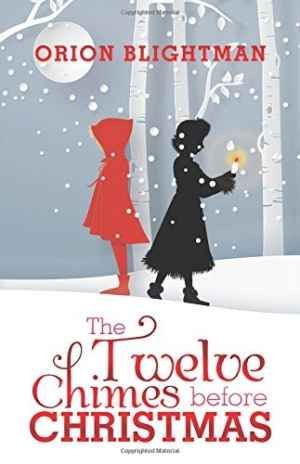The Twelve Chimes before Christmas
This collection trawls the underbelly of mysteries and dreams to transport potential merrymakers to a world where every choice is rendered in dark absolutes.
Evoking Victorian traditions around the holiday ghost story, Orion Blightman’s The Twelve Chimes before Christmas is divided into twelve stories, each a chime in the tolling of Christmas Eve’s final hour.
“Each chime holds a memory and a story to tell, written in poetry, a remnant of childhood and all that was good,” but “none of these stories should you expect to be merry or fanciful.” Rather, loss and forgetting are frequent themes as protagonists struggle with regret, squandered opportunities, and disconnection from humanity. An omniscient narrator prowls the margins of a fictional country village haunted by shadows, within and without.
The Twelve Chimes before Christmas utilizes a hybrid structure, telling twelve short stories in a series of narrative poems. In this instance, poetry is used as macabre device in the mode of the romantic sublime—something as terrifying as it is inspiring. The winter is lethal, children are abandoned, authorities are corrupt, and the rich are indifferent. Yet death waits for all, a warm specter contrasted with all the living darkness that permeates these tales.
However, the technical facility of the poetry isn’t on par with its ambition. Unlike the poems’ progenitors, free verse is used exclusively, and no rhyme propels the book’s long stretches of narrative. Lineation is haphazard, while abstractions and trailing punctuation abound. With so many blanks for the imagination to fill in, the narrative’s specificity and impact are undermined.
Each poem’s narrative builds toward a climatic resolution. The stakes are high and often revolve around moral absolutes. Most stories reach the zenith of their arc in the poem’s penultimate lines, as in “A Father’s Will,” where a father takes his “last breath beside the silent tomb”:
It was then, for a moment; he saw his little boy smiled at him for the very first time:
ever so slightly …
ever so gently …
But it was all enough for the loving father
to see the world for one last time
and the town once lost and forgotten …
The world was estranged
as did the first snow fall on the day of Christmas.
In this and other stories, the final lines commit a kind of erasure as the protagonist’s moment of insight falls away and the scene is set for the next chime. As the various stories fade to black, there’s no satisfying sense of resolution, but rather more questions in the face of persistent enigma.
The omniscient narrator uses baroque language and circular, sometimes contradictory, logic. Careful attention must be paid to follow archaic usages and convoluted syntax, making it hard to enter the fictional dream. Yet, the haunted, lugubrious imagery and mysterious circumstances of the quaint village and its real and spectral inhabitants pique interest. Thus, it’s particularly frustrating when linguistic flourishes occlude rather than reveal important plot points and character development.
A unique take on Christmas, The Twelve Chimes before Christmas centers the phantasmagoric and the often flawed nature of human relationships. At a slight remove from current concerns, this collection trawls the underbelly of mystery and dream in an attempt to transport potential merrymakers to a world where every choice is rendered in dark absolutes.
Reviewed by
Letitia Montgomery-Rodgers
Disclosure: This article is not an endorsement, but a review. The publisher of this book provided free copies of the book and paid a small fee to have their book reviewed by a professional reviewer. Foreword Reviews and Clarion Reviews make no guarantee that the publisher will receive a positive review. Foreword Magazine, Inc. is disclosing this in accordance with the Federal Trade Commission’s 16 CFR, Part 255.

